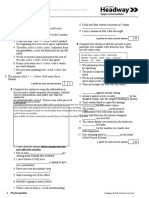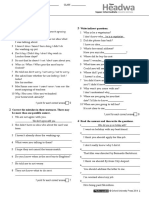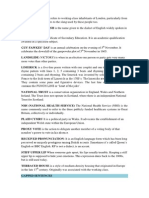0 ratings0% found this document useful (0 votes)
265 viewsActividad 7
Actividad 7
Uploaded by
Jorge Alejandro Escandon Gomez1. The passage discusses the stages of culture shock that people often experience when moving to a new country.
2. It begins by matching sentence beginnings about living in a new culture with endings that complete the ideas.
3. It then asks the reader to match definitions to underlined words from the passage and listen to a conversation about a man's business in his new country.
Copyright:
© All Rights Reserved
Available Formats
Download as DOCX, PDF, TXT or read online from Scribd
Actividad 7
Actividad 7
Uploaded by
Jorge Alejandro Escandon Gomez0 ratings0% found this document useful (0 votes)
265 views2 pages1. The passage discusses the stages of culture shock that people often experience when moving to a new country.
2. It begins by matching sentence beginnings about living in a new culture with endings that complete the ideas.
3. It then asks the reader to match definitions to underlined words from the passage and listen to a conversation about a man's business in his new country.
Original Title
actividad 7.docx
Copyright
© © All Rights Reserved
Available Formats
DOCX, PDF, TXT or read online from Scribd
Share this document
Did you find this document useful?
Is this content inappropriate?
1. The passage discusses the stages of culture shock that people often experience when moving to a new country.
2. It begins by matching sentence beginnings about living in a new culture with endings that complete the ideas.
3. It then asks the reader to match definitions to underlined words from the passage and listen to a conversation about a man's business in his new country.
Copyright:
© All Rights Reserved
Available Formats
Download as DOCX, PDF, TXT or read online from Scribd
Download as docx, pdf, or txt
0 ratings0% found this document useful (0 votes)
265 views2 pagesActividad 7
Actividad 7
Uploaded by
Jorge Alejandro Escandon Gomez1. The passage discusses the stages of culture shock that people often experience when moving to a new country.
2. It begins by matching sentence beginnings about living in a new culture with endings that complete the ideas.
3. It then asks the reader to match definitions to underlined words from the passage and listen to a conversation about a man's business in his new country.
Copyright:
© All Rights Reserved
Available Formats
Download as DOCX, PDF, TXT or read online from Scribd
Download as docx, pdf, or txt
You are on page 1of 2
1.
Read the article. Match sentence beginnings 1–11 with
endings a–l. There is one extra ending.
1. Living in another country (e)
2. Sometimes people feel confused and frustrated when they (f )
3. The first feeling most people experience in a new country (c)
4. People who feel angry and impatient in the new culture sometimes(g)
5. The stages are not experienced by everyone, as (h)
6. In the Honeymoon stage, people living in a new country(j)
7. Differences in the Honeymoon stage between the old and new culture (l)
8. When people go through the Negotiation stage, they slowly (d)
9. When people start getting used to the new culture, they(k)
10. Some people experience a reverse culture shock (b)
11. When people fail to get used to living in their new country, they (a)
2. Match five of the underlined words to the definitions
1. an unusual, exciting or dangerous experience
adventure
2. at the beginning initial
3. to enjoy or understand the value of appreciation
4. longer, increased extended
5. the usual order or way that you do things routine.
6. for ever permanently
3. Listen to a man talking about his business. Write true
(T) or false (F).
1 Pawel Kowalski is from Poland. T
2 Pawel and his wife live in Kielce, Poland. F
3 Pawel started his company three years ago. F
4 Pawel’s wife is British. T
5 Their company organizes things like weddings
and conferences T
6 In his previous job, Pawel was a security guard. F
7 Pawel’s company also provides security
arrangements. F
8 Pawel is in charge of cooking. F
9 The company serves dinners at wedding employs
permanent waiters. T
10 Pawel thinks foreign visitors don’t always enjoy formal
dinners. T
11 The company gets feedback from their clients F
4: Listen again. Complete the sentences from the text with
one word only.
1 I came over to Britain three years ago ... and I fell in
love with your country instantly.
2 Barbara ... is responsible for looking after employees and recruiting staff
3 We do a lot of bussiness events for the banking trade.
4 We always buy the freshest ingredients in the food
market.
5 We always try to provide whatever our clients request.
6 We get many positive comments from them.
You might also like
- AZ 700 OCT 24Document32 pagesAZ 700 OCT 24MarceloAffonsoNo ratings yet
- Headway Test Unit 5ADocument3 pagesHeadway Test Unit 5Akaro2511personalNo ratings yet
- HW5e Upp Unittest 05ADocument6 pagesHW5e Upp Unittest 05AEvelyn Ruiz Gaona100% (1)
- HW5e Int Test Unit 7ADocument4 pagesHW5e Int Test Unit 7ANatalia Conde100% (1)
- HW5e Int Test Unit 8ADocument3 pagesHW5e Int Test Unit 8ANatalia Conde50% (2)
- Folk Magic and Protestant Christianity in AppalachiaDocument35 pagesFolk Magic and Protestant Christianity in AppalachiaViktorija Briggs100% (6)
- HW5e Upp Unittest 08ADocument5 pagesHW5e Upp Unittest 08ADiego Diaz0% (1)
- Upp Int Unit 10 ADocument6 pagesUpp Int Unit 10 ATrip BrutaNo ratings yet
- UppInt Tests Answer KeyDocument15 pagesUppInt Tests Answer KeyJuan Antonio Serrano Guerrero50% (2)
- Unit Test 9A: 1 Point For Each Correct AnswerDocument3 pagesUnit Test 9A: 1 Point For Each Correct AnswerPetraOzimec100% (1)
- TPC Aula 5 - Unit 1B - 16.02.2023Document3 pagesTPC Aula 5 - Unit 1B - 16.02.2023Renata TrigueiroNo ratings yet
- HW5e PreIntermediate Test Unit 3BDocument3 pagesHW5e PreIntermediate Test Unit 3BNevena Trajkovic67% (3)
- Final Upper TestDocument4 pagesFinal Upper TestAhmet Gashi100% (1)
- Unit Test 11B: Write Only One Word in Each GapDocument3 pagesUnit Test 11B: Write Only One Word in Each GapRoselinaNo ratings yet
- Stop and Check 3 Units 9-12: Past Perfect and Narrative Tenses Joining SentencesDocument4 pagesStop and Check 3 Units 9-12: Past Perfect and Narrative Tenses Joining Sentencessudiman sudimanNo ratings yet
- Final Exam: Headway - IntermediateDocument7 pagesFinal Exam: Headway - IntermediateCece DimitrovaNo ratings yet
- Unit Test 4A: 1 We Are Not Agreed / Don't Agree / Aren't AgreeingDocument5 pagesUnit Test 4A: 1 We Are Not Agreed / Don't Agree / Aren't AgreeingТамерлан Вердиев100% (2)
- NHW - UppInt - TRD - Unit Test Answers PDFDocument1 pageNHW - UppInt - TRD - Unit Test Answers PDFZHANNANo ratings yet
- Expression With ComeDocument8 pagesExpression With ComecestibalizNo ratings yet
- Problem 1 PDFDocument67 pagesProblem 1 PDFStanley ChenNo ratings yet
- LCM Flute Diploma 2011-2015Document30 pagesLCM Flute Diploma 2011-2015Alan LuNo ratings yet
- Unit Test 11B: IntermediateDocument3 pagesUnit Test 11B: IntermediateFab DuBardNo ratings yet
- HW5e Int Skillstest 02Document4 pagesHW5e Int Skillstest 02anagalac2344100% (1)
- Headway Skills TestDocument3 pagesHeadway Skills Testanamariakasunic134167% (3)
- HW5e Int Workbook AKDocument9 pagesHW5e Int Workbook AKCerenNo ratings yet
- Test Unit 9ADocument3 pagesTest Unit 9Akaro2511personalNo ratings yet
- HW5e Upp Unittest 06ADocument3 pagesHW5e Upp Unittest 06AWiin Eill100% (1)
- HW5e Upp Unittest 12ADocument3 pagesHW5e Upp Unittest 12AKerem SayarNo ratings yet
- NHW UppInt TRD Prog Test AnswersDocument2 pagesNHW UppInt TRD Prog Test Answersnurislom xojimatovNo ratings yet
- Unit 6 - Intermediate Level, ReviewDocument1 pageUnit 6 - Intermediate Level, Reviewratiba157630No ratings yet
- HW5e Int Test Unit 9ADocument4 pagesHW5e Int Test Unit 9ANatalia CondeNo ratings yet
- Headway New - TestDocument7 pagesHeadway New - TestRalica CvetanovaNo ratings yet
- Unit Test 6A: 1 Choose The Correct Question That Goes With The AnswersDocument5 pagesUnit Test 6A: 1 Choose The Correct Question That Goes With The AnswersIon MirzaNo ratings yet
- Entry Test A: Intermediate IntermediateDocument3 pagesEntry Test A: Intermediate IntermediateIsidoro Cùlin RoldànNo ratings yet
- TPC HW5e-Int-Test Unit 2BDocument3 pagesTPC HW5e-Int-Test Unit 2BRenata Trigueiro100% (1)
- Unit Test 6B: 1 Choose The Correct Question That Goes With The AnswersDocument5 pagesUnit Test 6B: 1 Choose The Correct Question That Goes With The AnswersPaulNo ratings yet
- Unit Test 8A: 1 Complete The Sentences With The - Ing Form or The Infinitive of The VerbDocument5 pagesUnit Test 8A: 1 Complete The Sentences With The - Ing Form or The Infinitive of The VerbAnas ArshadNo ratings yet
- HW5e UpperInterm TR Tests Unit4Document3 pagesHW5e UpperInterm TR Tests Unit4Trip Bruta100% (1)
- 1 Grammar PlusDocument1 page1 Grammar PlusDAISY YANINA LARA GALVANNo ratings yet
- Stop and Check 2A Units 5-8: General Revision Future Forms, May/might/couldDocument3 pagesStop and Check 2A Units 5-8: General Revision Future Forms, May/might/couldPaul100% (1)
- HW5e Upp Unittest 07ADocument3 pagesHW5e Upp Unittest 07AMartín SanhuezaNo ratings yet
- Progress Tests Answers: Progress Test 1 Exercise 1 Exercise 8Document2 pagesProgress Tests Answers: Progress Test 1 Exercise 1 Exercise 8Cristian Alexis Perez100% (1)
- AHW3e - Level 2 - Unit Practice 9aDocument5 pagesAHW3e - Level 2 - Unit Practice 9aJORGE DE JES�S ROJAS REND�NNo ratings yet
- Unit Test 8B: 1 Point For Each Correct AnswerDocument3 pagesUnit Test 8B: 1 Point For Each Correct AnswerPhyu Sin WinNo ratings yet
- Unit Test 3B: 1 Complete The Sentences With The Correct Form of The Verb in The Past Simple or Past PerfectDocument5 pagesUnit Test 3B: 1 Complete The Sentences With The Correct Form of The Verb in The Past Simple or Past PerfectValeria KuchmiichukNo ratings yet
- Hwy Int Stopcheck AnsDocument3 pagesHwy Int Stopcheck AnsAli RIXSIBOYEV100% (1)
- AHW3e - Level 04 - Progress Test 1Document3 pagesAHW3e - Level 04 - Progress Test 1Răzvan Adrian Cârcu50% (2)
- Hwy Pre Int Unittests 12a PDF Free2Document4 pagesHwy Pre Int Unittests 12a PDF Free2Jirkanet 323No ratings yet
- Hwy Int Stopcheck 3aDocument3 pagesHwy Int Stopcheck 3aUmid RakhmanovNo ratings yet
- HW5e PreIntermediate Test Unit 10ADocument3 pagesHW5e PreIntermediate Test Unit 10ASam44No ratings yet
- Expert B2 - Stop and Check 1 - Units 1 To 4Document3 pagesExpert B2 - Stop and Check 1 - Units 1 To 4Eron JuniorNo ratings yet
- Hwy Int Unittests 8a PDFDocument3 pagesHwy Int Unittests 8a PDFTatjana Talijan Cvetkovic50% (2)
- Unit Test 10 - Inlges C (II)Document4 pagesUnit Test 10 - Inlges C (II)David Ricote Sánchez100% (1)
- Progress Test 2 Units 7-12: Exercise 1 Present Perfect and Past Simple Exercise 3 Have To/don't Have To Should/mustDocument4 pagesProgress Test 2 Units 7-12: Exercise 1 Present Perfect and Past Simple Exercise 3 Have To/don't Have To Should/mustNguyễn Duyên100% (1)
- Unit Test 8B: 1 Complete The Sentences With The - Ing Form or The Infinitive of The VerbDocument4 pagesUnit Test 8B: 1 Complete The Sentences With The - Ing Form or The Infinitive of The VerbjojoNo ratings yet
- 8 RC Quiz Oct 5-8 PDFDocument1 page8 RC Quiz Oct 5-8 PDFSandra Liliana Paez MoralesNo ratings yet
- Hwy Int Skillstest AnswersDocument5 pagesHwy Int Skillstest AnswersFab DuBard100% (1)
- Unit Test 3A: 1 Complete The Sentences With The Correct Form of The Verb in The Past Simple or Past PerfectDocument4 pagesUnit Test 3A: 1 Complete The Sentences With The Correct Form of The Verb in The Past Simple or Past PerfectГаухар ОмарNo ratings yet
- Headway Upper Intermediate Unit 6A TestDocument3 pagesHeadway Upper Intermediate Unit 6A Testaaaaaa100% (3)
- Entry Test AnswersDocument2 pagesEntry Test Answersedu-londonNo ratings yet
- Unit Test 4B: 1 Complete With The Missing Forms of The Modal VerbsDocument4 pagesUnit Test 4B: 1 Complete With The Missing Forms of The Modal VerbsChristina lNo ratings yet
- Unit Test 1B: WhoseDocument3 pagesUnit Test 1B: WhosePhyu Sin Win100% (1)
- Speakout Intermediate Unit 1Document5 pagesSpeakout Intermediate Unit 1zkj07911No ratings yet
- UNIT 1,2: Student Name Group/Class Date ScoreDocument3 pagesUNIT 1,2: Student Name Group/Class Date ScorecristinaNo ratings yet
- Childhood Illness Prevalence and Health Seeking Behavior Patterns in Rural TanzaniaDocument12 pagesChildhood Illness Prevalence and Health Seeking Behavior Patterns in Rural Tanzaniafiora.ladesvitaNo ratings yet
- HIV in Mothers and Children: What's New?Document5 pagesHIV in Mothers and Children: What's New?VeronikaNo ratings yet
- 12 - E2language Test IV PDFDocument26 pages12 - E2language Test IV PDFAbdullah Mohammad Ibne HaiderNo ratings yet
- Eebies UnburiedKing WithMiniDocument4 pagesEebies UnburiedKing WithMiniLudovic Draiganix GrondinNo ratings yet
- Wlan Setup GuideDocument66 pagesWlan Setup GuideMagara EdwinNo ratings yet
- Airport EngineeringDocument75 pagesAirport EngineeringMonika AcharyaNo ratings yet
- Prac.U1 3.ML - Pre - List - Reading PDF Automation Employment 2Document1 pagePrac.U1 3.ML - Pre - List - Reading PDF Automation Employment 2oguztmNo ratings yet
- BTVN 10-8Document4 pagesBTVN 10-8Nguyen LuyenNo ratings yet
- HL Pay & Save-I Account 112022 2Document2 pagesHL Pay & Save-I Account 112022 2naidaNo ratings yet
- Nos 720 UpgradeguideDocument37 pagesNos 720 Upgradeguidesushant_beuraNo ratings yet
- vm9 FiringchartDocument1 pagevm9 Firingchartjohn.pobligonNo ratings yet
- 【写作 范文】前考官Simon:34篇雅思小作文范文Document36 pages【写作 范文】前考官Simon:34篇雅思小作文范文Zhuan-Xian MaoNo ratings yet
- International Marketing (B2B)Document1,050 pagesInternational Marketing (B2B)Dennison NananNo ratings yet
- Research Article: Shantha Seelan.G and Esha SharmaDocument4 pagesResearch Article: Shantha Seelan.G and Esha Sharmagunesh1No ratings yet
- King ApplicationDocument75 pagesKing ApplicationJenniferNo ratings yet
- Hassan Nisar's Potential PlagiarismDocument1 pageHassan Nisar's Potential PlagiarismAjayPandeyNo ratings yet
- Environment: Module 1 - Environmental Science - A Multidisciplinary SubjectDocument87 pagesEnvironment: Module 1 - Environmental Science - A Multidisciplinary SubjectALAN SIBY JUNo ratings yet
- Structure Equation Analysis On Customer Satisfaction of Public Transport: An Empirical Study in Klang Valley MalaysiaDocument5 pagesStructure Equation Analysis On Customer Satisfaction of Public Transport: An Empirical Study in Klang Valley Malaysiashakthi jayanthNo ratings yet
- Huawei Certification HCNP Lab Guide HCNP-IERN v1.6 PDFDocument475 pagesHuawei Certification HCNP Lab Guide HCNP-IERN v1.6 PDFGustavo BacaláNo ratings yet
- tài liệuDocument4 pagestài liệuPhước Thắng TốngNo ratings yet
- The Professional BartenderDocument84 pagesThe Professional BartenderJay-are Bayaua100% (1)
- Mercedes RapportDocument137 pagesMercedes RapportFatima Ezzahra El MasbahiNo ratings yet
- Broiler Management ChartDocument3 pagesBroiler Management ChartTofara Carel GiwaNo ratings yet
- American Express: Small Business SaturdayDocument2 pagesAmerican Express: Small Business SaturdaySHIVANSHU PANDEYNo ratings yet
- Raport: Lucrarea de Laborator Nr. 6 Disciplina: Programarea de Sistem Și de RețeaDocument8 pagesRaport: Lucrarea de Laborator Nr. 6 Disciplina: Programarea de Sistem Și de RețeaDutca AlexandruNo ratings yet
- System Admin - Cloud EngineerDocument5 pagesSystem Admin - Cloud EngineerMarkNeilDeeNo ratings yet

























































































